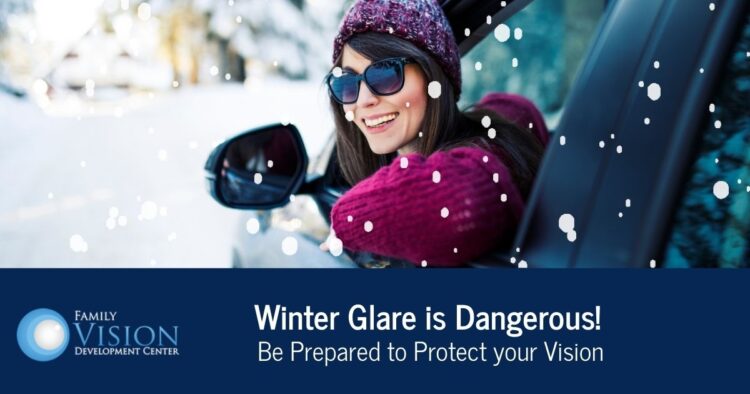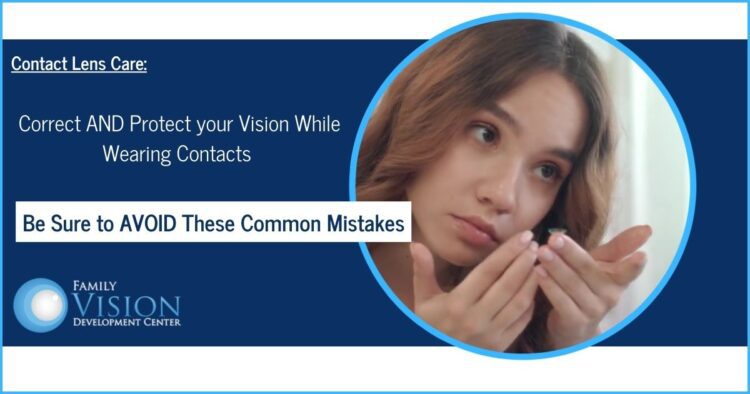

Prepare for the Glare & Protect your Eyes this Winter in 1 Easy Step
As winter weather quickly approaches, it is important to be prepared for a unique visual challenge that often accompanies snow-covered landscapes – glare. While a winter wonderland can certainly be beautiful, the reflective nature of snow intensifies sunlight, causing a brightness that can significantly impact our vision.
How Glare Affects Vision
Winter glare occurs due to the reflective properties of snow and ice. When sunlight hits the white surface, it bounces back, creating an amplified intensity that can overwhelm the eyes. This is known as snow blindness, or photokeratitis, and can cause an increased risk of eye damage. Snow blindness occurs when UV light enters the cornea of the eye, inflaming the epithelium. When agitated, this sensitive outer layer becomes irritated and inflamed, resulting in a variety of symptoms. Some of these symptoms include:
- Photophobia or light sensitivity
- Painful burning sensation in the eyes
- Visible redness in the eyes
- Excessing tearing or watering
- Blurred vision
- Swollen eyes or eyelids
- Headaches
- Halo effects around light sources
Prepare for Glare in these Situations
Winter glare can present itself in a variety of situations so be prepared while:
Driving – drivers can experience glare from snowy surroundings, as well as frozen surfaces such as ice-covered roads and sidewalks or bodies of water. Additionally, because of the sun’s relative position to Earth in winter, the sun’s rays hit Earth at a lower angle. This can cause increased glare on the roads, which can create dangerous driving conditions especially during the early morning or late afternoon hours.
Participating in Winter Sports – many people enjoy the sporting activities available in winter months, such as skiing, snowboarding or snowmobiling. But these activities obviously involve being in or around a lot of snow, so it is important to remember the damage that glare can cause and take the appropriate precautions.
Shoveling – Although not usually a favorite winter activity, shoveling snow is often a necessity for many people. Oftentimes, people will be out tackling their snow-covered driveways in the morning, before heading out to work or school. This is prime time for the sun’s rays to reflect off snow or ice-covered surfaces, causing potential eye damage.
One Surefire Solution to Prevent Glare
The easiest and most effective way to prevent glare this winter is to wear protective eyewear! Although it might sound like a simple solution, many people go out every day without any type of protection for their eyes. But wearing a good pair of sunglasses can be crucial to preventing damage. When selecting sunglasses, always make sure that they block 100% of the sun’s UV-A and UV-B rays. Glare that reflects off of snow or ice can intensify UV exposure, but high-quality sunglasses can offer much-needed protection. Additionally, polarized sunglasses offer a very effective way to reduce glare and will significantly increase your ability to see clearly during bright conditions.
Protective eyewear can come in different forms. For example, sunglasses should be worn every time you go outside. In fact, keeping an extra pair in the car can ensure that you have them when you need them and provide safety while driving at any time of day. Wearing sports goggles while engaging in outdoor winter activities will protect your eyes from glare, as well as any flying ice particles that could damage your eyes. Additionally, prescription eyeglasses can be customized with glare-reducing coatings to provide additional daily protection from glare.
The team at Family Vision Development Center is dedicated to your healthy vision! Our extensive optical center has a variety of glasses and sunglasses that can help prevent harmful glare in your daily life. Contact us at 630-862-2020 to schedule a visit for a vision exam or for a consultation in our optical center.
Family Vision Development Center is a full-service vision center offering innovative vision therapy services, sports vision therapy services, post-concussive vision rehabilitation, comprehensive vision exams for eyeglasses and contact lenses, management of ocular diseases including glaucoma, diabetes, macular degeneration and cataracts, and a state-of-the-art optical center offering the latest designs in eyewear.

